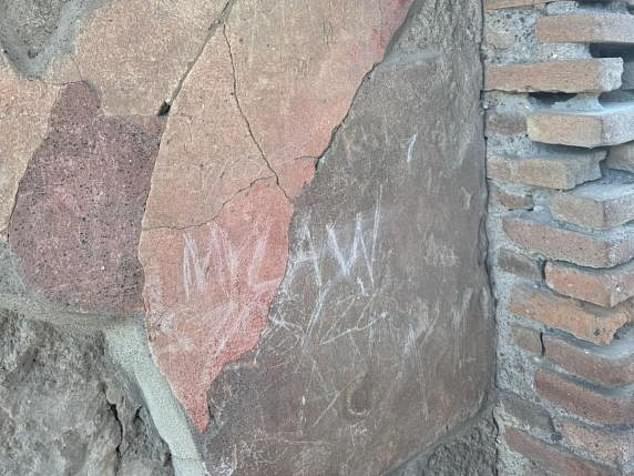A British tourist has been severely punished by Italian authorities after carving his initials and those of his two daughters into the wall of one of Pompeii’s most famous and protected ancient sites.
The 37-year-old made five etchings in total, which included his initials and the date, with a blunt object on the wall of the House of the Vestal Virgins, recognized by UNESCO as a World Heritage Site.
Pompeii lies beneath Mount Vesuvius and was famous for being buried and preserved for posterity by a massive eruption in 79 AD.
The House of the Vestal Virgins once housed the virgin priestesses of the Roman goddess Vesta, who ruled over the hearth, home and family.
It suffered some damage during World War II, but much of the site’s deterioration has been caused by erosion over the centuries.
However, tourists marvel at the mosaics and frescoes that adorn the house built almost 2,000 years ago.
The actual graffiti etched on the wall of the House of the Vestal Virgins in Pompeii by the tourist, which includes his initials and those of his daughters, JW, LMW and MW, along with MLAW and the date 07/08/24
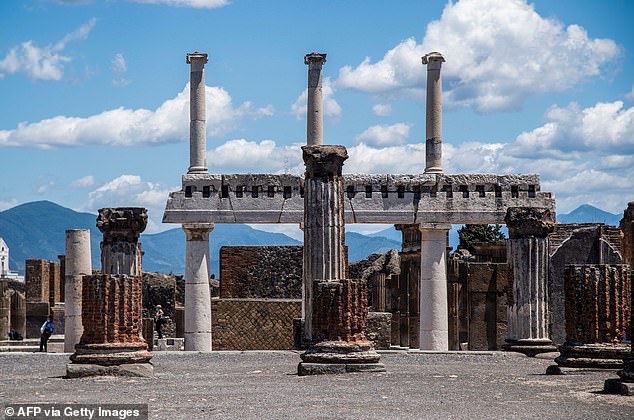
Pompeii lies beneath Mount Vesuvius and was famous for being buried and preserved for posterity by a massive eruption in 79 AD.
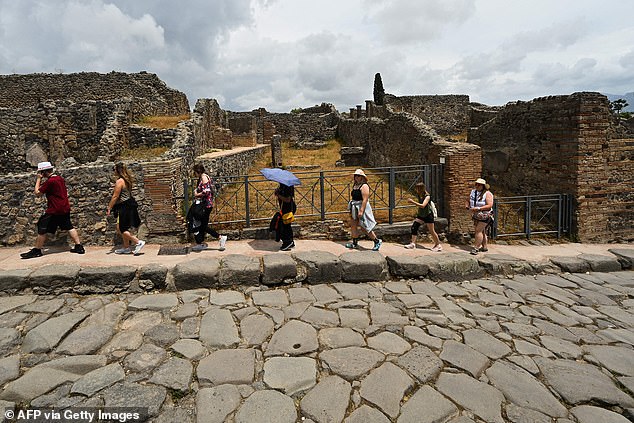
The 37-year-old tourist is likely to be asked to pay for repairs to the ancient site after apologising for carving his initials into the House of the Vestal Virgins.
The new graffiti includes the letters JW, LMW and MW, along with MLAW and the date 08/07/24, as shown in images from the scene.
According to the Italian media Secolo d’ItaliaStaff had noticed the man standing near the frescoed section at the entrance to the House of the Vestrales and discovered the engravings after he left.
Outraged by the graffiti, they identified the man and reported him to the Public Prosecutor’s Office at the Torre Annunziata Court, Corriere Della Sera reports.
When asked to explain, the man apologized and said he wanted to show that the family had visited the historic site.
The man has already been cited for damaging cultural heritageaccording to Italian media outlet ANSA and is likely to have to pay for any restoration.
This is not the first time British tourists have had problems at the beloved site, which is one of Italy’s most popular historical attractions.
In June, a tourist was caught carving his name into an ancient wall in Pompeii.
The man, who is from Kazakhstan, was reportedly caught red-handed damaging one of the city walls, which lies beneath Mount Vesuvius and was buried by the volcano’s eruption in 79 AD.
The anonymous vandal was arrested while carving ‘Ali’ in light plaster at the House of the Ceii, an ancient villa that probably belonged to the magistrate Lucius Ceius Secundus.
Italian authorities said the man will have to pay for restoration work to be carried out on the wall to remove the graffiti after he was reported to police.
This comes a year after a Bristol tourist was caught carving his and his girlfriend’s names into Rome’s 2,000-year-old Colosseum.
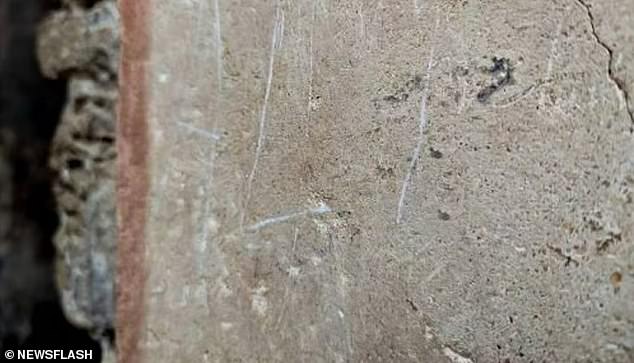
In June, an anonymous vandal was arrested while carving “Ali” in light plaster at the Casa de los Ceii (pictured).
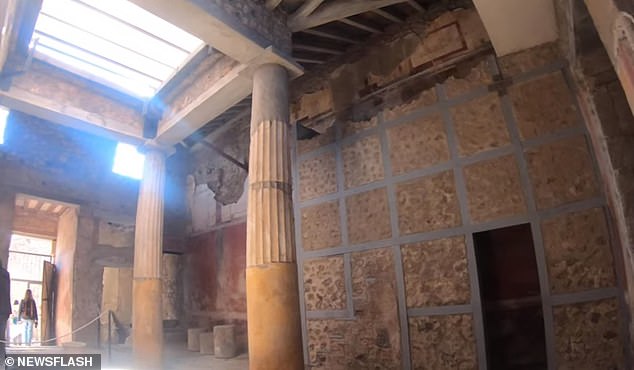
General view of the House of the Ceii, an ancient villa that probably belonged to the magistrate Lucius Ceius Secundus
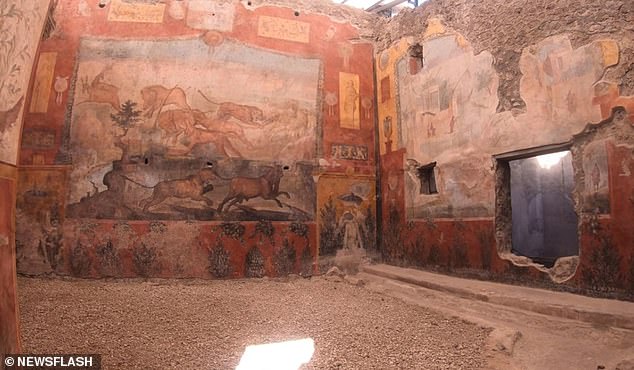
The photograph shows murals in the ancient Casa dei Ceii in Pompeii, Italy.
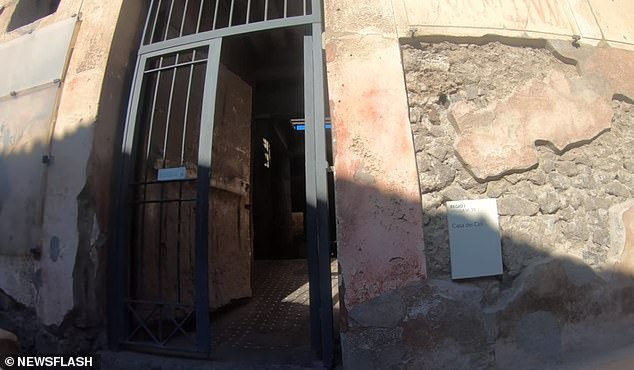
The entrance to the ancient villa, which is a popular spot for tourists visiting the site.
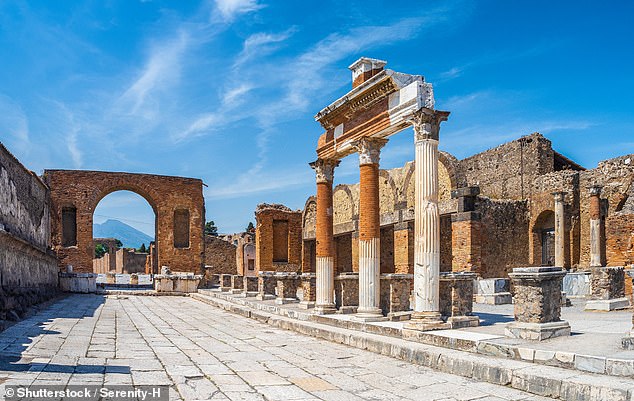
Pompeii lies beneath Mount Vesuvius and was buried by the eruption of the volcano in 79 AD (file image)
The park’s director, Gabriel Zuchtriegel, said at the time: “It is an uncivilized act. Thanks to the new law supported by Minister Gennaro Sangiuliano, the perpetrator of the crime will have to pay for the restoration of the wall.”
“Congratulations to the ministry’s collaborators and to the Ales company who intervened quickly. Excellent collaboration with the police, whom we thank for their promptness.”
The Pompeii Archaeological Park states on its website that the House of the Ceii is “one of the rare examples of ancient dwellings from the late Samnite period (2nd century BC).”
They also say: ‘Upon entering the house you can see the impluvium bath which is made with fragments of amphorae placed on their edges, a common technique used in Greece and attested in Pompeii also in the Ancient Hunting House.
‘The back wall of the small garden is decorated with wild animals, a very successful theme in the decoration of open spaces.
‘The side walls depict Egyptian-style landscapes with animals from the Nile Delta, which probably indicated a link between the owner of the house and the cult of Isis, which was widespread in Pompeii in the last years of the city’s life.’
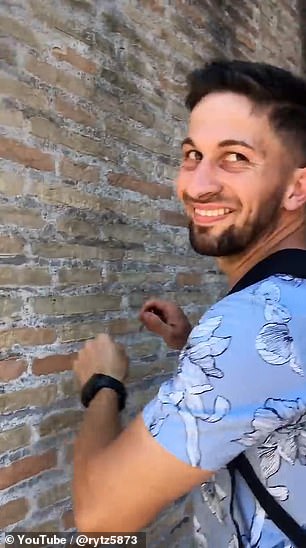
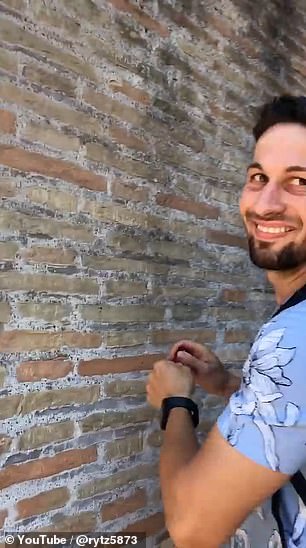
A passerby filmed Dimitrov, a fitness instructor from Bristol, carving names into the stone walls of the 1,937-year-old building using a set of keys on June 23.
As peak season approaches, Italian authorities will be keeping a close eye on the country’s iconic landmarks after a series of senseless attacks on Italy’s beloved historic sites last summer.
In the town of Herculaneum, which was also covered in volcanic ash when Vesuvius erupted in AD 79, a tourist from the Netherlands was reprimanded for “signing” an ancient wall.
Then, in August, two German tourists were arrested for covering a historic monument in Florence with football graffiti.
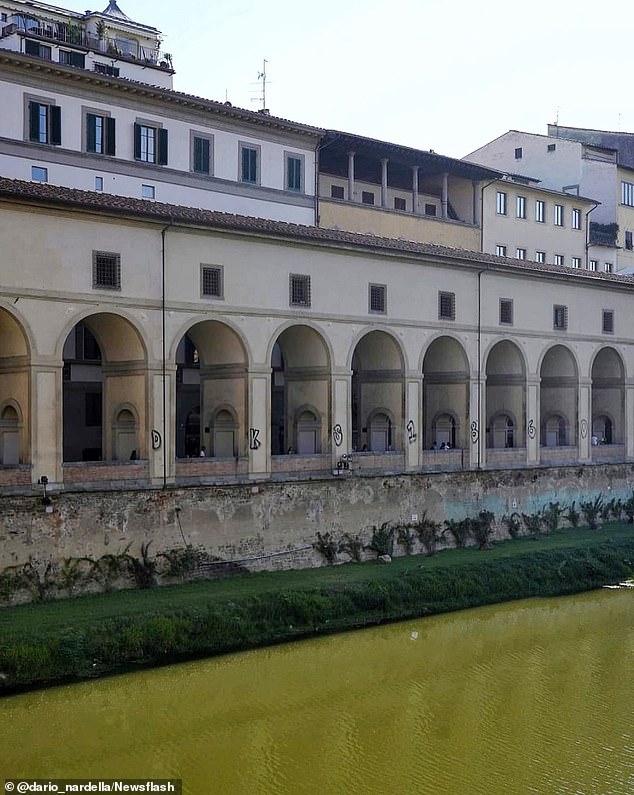
Locals were left stunned by the disrespectful behaviour of tourists who defaced the corridor connecting the prized Uffizi Gallery and the Pitti Palace.
The men are said to have used black spray paint to write ‘DKS 1860’ on the 460-year-old columns of Florence’s iconic Vasari Corridor.
The corridor connects the prized Uffizi Gallery and the Pitti Palace and was originally built for the powerful Medici family.
And in a now-famous shocking incident, a Bulgarian-born, Bristol-based fitness instructor was filmed smiling as he smashed through the wall of the Colosseum.
Ivan Dimitrov, 27, was on holiday in Rome with his girlfriend Hayley Bracey, 33, when he was caught carving the words ‘Ivan and Hayley 23’ into the brickwork with a set of keys.

